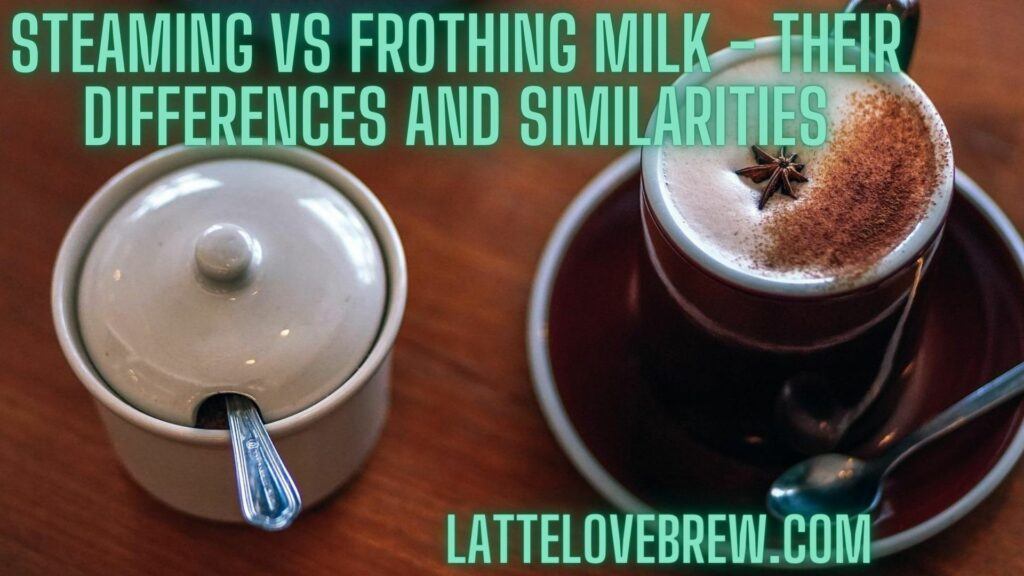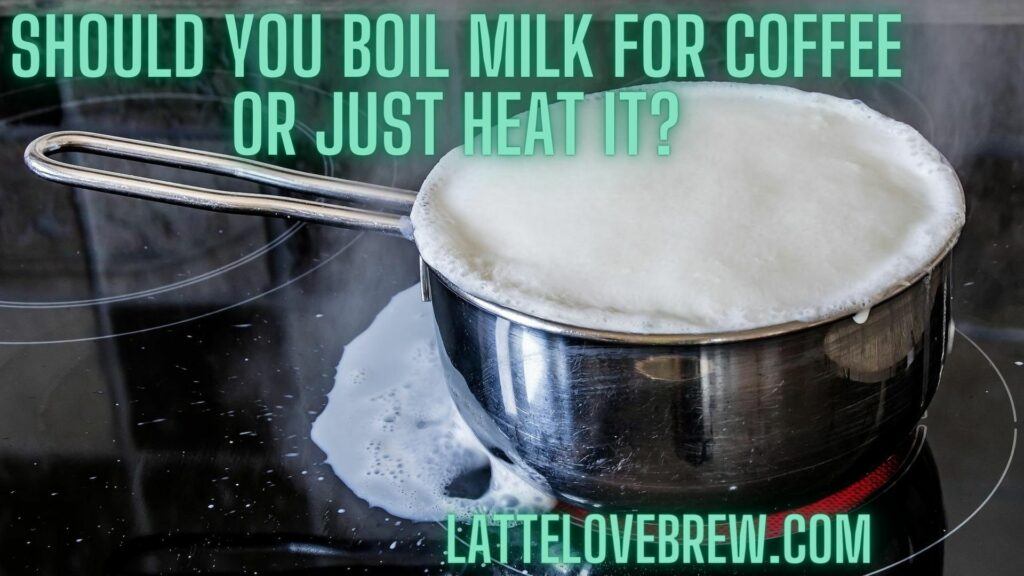Last updated on July 28th, 2024 at 14:22
We got this one question posed on our social media when Ivan asked us “Why does my coffee taste bitter all of a sudden?”
There are many reasons why your coffee tastes bitter. One principal reason is that coffee is a bitter drink, but it should not be overtly bitter; it should be enjoyed. I’ll talk about those in a minute.
If you are in a rush, here is the quick answer.
When your coffee tastes too bitter, all of a sudden your coffee is probably over extracted. There could be a number of reasons why this happened. Too fine a grind size, too high a brewing temperature, using too much coffee grinds, old coffee beans, the wrong type of coffee bean, dirty brewing equipment, poor tamping and more.
Keep reading as we dig down and detail Ivan’s question with the very detailed answer that it deserves!
What Does Bitter Coffee Taste Like?
Table Of Contents
- 1 What Does Bitter Coffee Taste Like?
- 2 Why Does My Coffee Taste Bitter All Of A Sudden? My Top 12 Reasons!
- 2.1 #1 Your Grind Is Too Fine
- 2.2 #2 Your Brew Time Was Too Long
- 2.3 #3 Your Brew Temperature Was Too Hot
- 2.4 #4 You Used Too Much Water While Brewing
- 2.5 #5 You Used Too Much Coffee
- 2.6 #6 Your Gear Is Dirty
- 2.7 #7 Poor Tamping
- 2.8 #8 You Used Low Quality Beans
- 2.9 #9 You Brewed With Too High A Roast
- 2.10 #10 Poor Water Quality
- 2.11 #11 Your Beans Were Not Fresh
- 2.12 #12 Where Your Beans Come From
- 3 Should My Coffee Taste Bitter?
- 4 How To Taste The Good Bitterness
- 5 Is Bitter Coffee Bad For You?
- 6 Frequently Asked Questions About Why Does My Coffee Taste Bitter
- 6.1 How Do You Take The Bitterness Out Of Coffee?
- 6.2 Is There A Coffee That Is Not Bitter?
- 6.3 Why Is My Coffee Bitter And Sour?
- 6.4 Does Salt Make Coffee Less Bitter?
- 6.5 Why Does Coffee Suddenly Taste Awful To Me?
- 6.6 How Do You Know If Coffee Is Too Bitter Or Sour?
- 6.7 Does Too Hot Water Make Coffee Bitter?
- 6.8 Does Adding Milk To Coffee Reduce Bitterness?
- 7 Frappé-Ing It All Up – Why Does My Coffee Taste Bitter?
Some coffees have a flavor that has a deep bitterness that is similar to dark chocolate, others have a light, almost fermented bitterness similar to a low quality wine. Some coffees have a rather tart bitterness that is like a grapefruit.
The main reasons why you have bitter coffee, as any barista or coffee lover worth his or her salt will tell you, comes down to 4 reasons:
- 1. Dirty Coffee Makers.
- 2. Low Quality Water.
- 3. Bad Beans.
- 4. Bad Brewing Skills.
All of the above factors lead to a low-quality coffee in general, be it too bitter, too sour, too acidic or burnt.

Read: How to make coffee less acidic
Why Does My Coffee Taste Bitter All Of A Sudden? My Top 12 Reasons!
Let’s get down to the meat and bones of this article and talk about why your coffee tastes too bitter. One of the factors is buying low-quality coffee beans. This is why I encourage you to buy the best coffee beans that you can afford.
Coffee is cheap and works out at 30 to 40 cents per cup when you buy specialty-grade coffee beans, which is the highest quality grade. Even the very best of the best beans and most expensive ones work out at 50 cents or less per cup of coffee.
If you are buying great beans, there is no other way to put it – you are the problem!
(Don’t worry, Latte Love Brew is here to help you!)
More often than not, bitter coffee is because you have over-extracted coffee.
When your coffee beans get over brewed they start to extract extra flavors into your cup of coffee, you know, an extra dose of bitterness.
Let’s dig down and really talk about what is making your coffee taste bitter. Knowing why it will help you to fix the situation and enjoy optimal extraction when using various coffee brewing methods.

Read: How to tell if coffee is rancid
#1 Your Grind Is Too Fine
The smaller your coffee ground, the quicker your hot water will extract the flavors from them. When you grind to a smaller grind size, the surface area of your coffee increases, meaning a greater amount of water is in contact with them and the more flavors are extracted and over extraction happens.
All the balanced flavors are pulled out, and you have all the good notes, which then get spoiled by drawing out too much of them and the stronger and not-so-nice stuff.
#2 Your Brew Time Was Too Long
If you have a perfect and consistent grind size, you can still cause over extraction of flavors by having too long an extraction time. When that happens, you have a cup of coffee that is too bitter.
With an espresso machine, the issue could be too strong a tamp (assuming the grind size is perfect), with pour over coffee it is most likely caused by too fine a grind size and your water took too long to flow through your coffee.
Another cause of over brewing with a pour over and drip coffee can be the use of a paper filter that is too thick and holds the water in that little bit longer. The same can occur with a cotton cloth filter and a metal mesh filter that has holes that are too fine.
With a French press, it is likely that you have waited for too long before you pushed down on the plunger.
#3 Your Brew Temperature Was Too Hot
The perfect brewing temperature for coffee is 92C to 96C (195F to 205F). Outside the ideal temperature, you will start to get a bitter taste at the higher end and sour at the lower temperatures.
The only exemption to this rule is cold brewed coffee which is brewed at a very low temperature, 2C to 5C (35F To 41F) and for 12 hours to 24 hours. The extra long extraction prevents a cold brew from being sour.
Accurate water temperature will ensure you are not and will not over extract your coffee. You can use a digital kettle with temperature control for accurate control over the temperature of your water, or you can go old school and use a thermometer.
Personally, the lazy side of me prefers the set and forget of the digital kettle. Do check it is accurate by testing it with a thermometer every few months.
Never use boiling water.
The hotter the water, the better and faster it extracts the compounds from your coffee grounds, resulting in a greater yield which leads to over extraction, not to mention the potential of bitter and burnt coffee. Stick to the ideal brewing temperature range.
#4 You Used Too Much Water While Brewing
If you used too much water and blew past the sweet spot of the golden ratio and did not quite reach that perfect coffee to water ratio. When this happens, each individual coffee ground will need to extract more than the perfect amount beyond the sweet spot and start extracting more of the bitter compounds.
It is rare to brew a good quality coffee with too much water. It will either be over brewed or watery.

#5 You Used Too Much Coffee
Also, don’t use too much coffee grounds. If you do that, you will have too much coffee in relation to the water and not aligned with the coffee to water ratio.
Using too much coffee will lead to a coffee taste that is too strong and too bitter. Use the right coffee to water ratio for the brewing method that you are using.
#6 Your Gear Is Dirty
Over extraction is only one culprit for bitterness in coffee. The coffee residue and coffee oils from old previously brewed coffee can and will negatively affect the flavor of your coffee.
This is obviously more applicable to espresso machines, coffee drippers and capsule based coffee machines, Moka pots, percolators and similar brewing equipment.
Coffee particles and oils can get stuck everywhere, including the pipes, groupheads, portafilters, boilers, pumps, valves…everywhere, literally!
Trust me,
if you have ever taken apart an espresso machine, you will know what I am talking about. Clean your machine and clean it properly and regularly. Ensure you flush out the pipes.
#7 Poor Tamping
Poor tamping skills are a concern for espresso brewing and worthy of mentioning as 2 out of every 3 coffees brewed globally is an espresso shot.
When your tamp is too tightly packed, it will inhibit the flow of your water and increase the extraction time, which leads to the problem of an overtly bitter tasting coffee.

#8 You Used Low Quality Beans
When you buy cheap coffee, you can expect a bean that is over-roasted to hide the imperfections that are caused by mass harvesting and low-altitude cultivation. Over roasted coffee beans taste burnt, ask like and bitter.
There is nothing you can do here other than buy better beans.
#9 You Brewed With Too High A Roast
This follows on from rule 8 above. The darker the roast, the more bitter they will be. Light and medium roasts are less bitter and have more of the flavors of the origin.
#10 Poor Water Quality
Your coffee is predominantly made from water; it is the main ingredient. Although there is nothing that will make your water bitter, the better the quality of your water, the better the end result will be.
At the very minimum, you should use filtered water. The best is distilled water as it is pH neutral. Using a water filter will help to prolong your espresso, Nespresso machine and your drip coffee machine as it is a form of preventative maintenance, preventing mineral deposits and lime scale from getting into your machine.
#11 Your Beans Were Not Fresh
Fresh coffee beans are coffee beans that have been roasted no longer than 7 days ago. At a push, you could extend that to 10 days.
The peak freshness window for your coffee beans is 2-3 days after roasting and 7 days thereafter.
Check the roasted on date of your beans.
Your coffee beans do not stay fresh forever, unfortunately!
Pro Tip: Store your coffee bean in a professional coffee canister with an airtight lid and one-way valve. Then store your canister in your freezer. Your beans won’t freeze, but you will have fresher, better coffee for a little longer.

#12 Where Your Beans Come From
Certain origins create beans that have different characteristics and are naturally more bitter than others. Learn about beans that are grown in different parts of our beautiful blue dot and what flavors to expect from them.
Colombian, Ethiopian, Kona, Costa Rican are less bitter than others.
Also, select the right type of bean. Robusta is more bitter than Arabica and thus seek out an Arabic bean that is lightly roasted from a region that is not known for bitter notes.
Should My Coffee Taste Bitter?
Coffee is associated with bitterness and bitter flavors. There is a role that those flavors play in a great cup of coffee, but it is not the dominant taste and is far from overbearing.
A well-brewed cup of coffee has room for a variety of flavors that are locked inside the coffee beans and will be unlocked by a good barista. These flavors can include floral, nutty, chocolate and fruity notes.
How To Taste The Good Bitterness
There will be a slight taste or hint of bitterness in a cup of coffee ever the best of the best specialty-grade coffee beans.
This is a good thing.
A good, soft and balanced bitterness will create a layer from which the lighter and brighter flavors stand on and be noted. It makes your coffee taste amazing.
A few examples of what a well brewed cup of coffee can taste like with a good level of bitterness.
- Like a pineapple, bitter-sweet.
- Like a chestnut, warm and complex.
- Like dark chocolate, deep, dark and creamy.
Here are a few flavor note examples of what delicious bitterness can taste like:

Is Bitter Coffee Bad For You?
No, bitter coffee is not bad for you, and it is not a bad thing for your coffee. If you did not have that bitter tone, it would be either sour or too acidic or too sweet.
The bitterness is essential to a great cup of coffee.
Frequently Asked Questions About Why Does My Coffee Taste Bitter
How Do You Take The Bitterness Out Of Coffee?
You can reduce the bitterness of your coffee by adding a pinch of salt, adding cream, milk, butter, ice cream to reduce the bitterness of your coffee.
Is There A Coffee That Is Not Bitter?
Yes,
high quality Arabica coffee beans that have been roasted to a medium or light roast have very little bitterness to them at all. The bitter flavor is hardly noticeable. You can buy your coffee beans from a local specialty roaster and request that they are roasted to have minimal bitter compounds in them.
Why Is My Coffee Bitter And Sour?
There are a number of reasons for the bitterness in coffee and an overtly bitter brew. One reason is an over-extracted, bitter coffee. Another reason could be the coffee beans are over-roasted or poorly brewed.
It is the skills of both the master roaster and barista together that get you a well-brewed cup of coffee with balanced bitterness and acidity that highlights the natural flavors, aromas and tones of the coffee beans.
Does Salt Make Coffee Less Bitter?
Yes,
a pinch of salt, and just a pinch of salt either to the cup of over brewed or bitter coffee or to the coffee grounds will help to reduce the bitterness and result in a more rounded flavor.
James Hoffman, coffee influencer and 2007 world barista champion, suggests making a saline solution and using a dropper to mix in a few droplets into the brewed coffee. This is a more controlled way of measuring how much salt is used. However, it is difficult to control and measure the salt content of the saline solution.
Why Does Coffee Suddenly Taste Awful To Me?
If the smell or taste of your regular coffee suddenly changes, be on the safe side and take it as an early warning sign of a medical problem and take action immediately. It may be something simple like a nasal passage blockage or a sinus infection. It is best to be safe and seek medical advice.
How Do You Know If Coffee Is Too Bitter Or Sour?
You will be able to tell if your coffee is too bitter or sour if you taste test it. Under extracted coffee will taste sour while over extracted coffee will taste bitter. Weak coffee will taste papery while strong coffee is ashy.
Does Too Hot Water Make Coffee Bitter?
Yes, if your hot water is too hot, it will over extract the bitter notes and the resulting coffee will taste too bitter. The ideal extraction temperature is 195F to 205F.
Does Adding Milk To Coffee Reduce Bitterness?
Yes, milk has lactose, a milk based sugar and thus adding it to coffee will reduce the bitterness naturally due to the milk sugars and the sweetness of the milk.
Frappé-Ing It All Up – Why Does My Coffee Taste Bitter?
If that question “why does my coffee taste bitter?” flies around your mind, you have the answer above in the 12 reasons listed. If you have skimmed down and not read the post, you can skim back up and read and find out what they are.
Bitter coffee, more often than not, is the result of over-extracted coffee. You really only need to find out what is causing the over extraction and fix it.
Join our cool coffee community and share your own great ideas for reducing the bitterness of your coffee in clean and healthy ways! Find us on Facebook/Meta!







